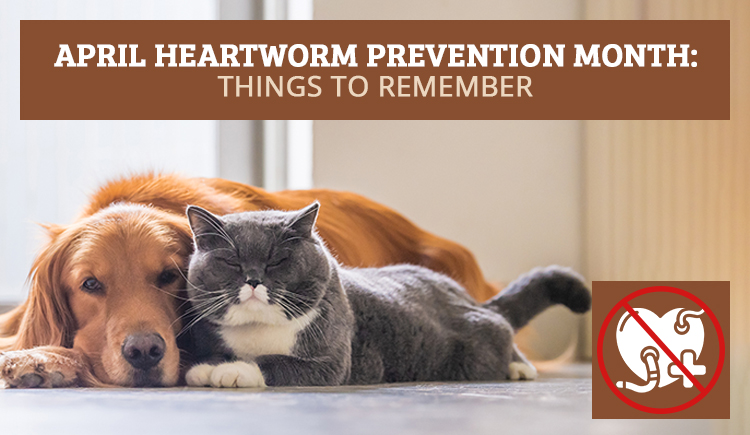
Heartworms can be nightmares for pet parents, especially those with dogs. Heartworm infection is spread by mosquitoes and can make your pet severely sick, even taking its life if preventative measures are not taken. Like most diseases, prevention is the best treatment for heartworms. The month of April is dedicated to National Heartworm Preventive Month, serving as a timely reminder to acknowledge this serious illness and follow preventative measures to protect our pets.
In this blog, we will discuss heartworms in pets, including dogs and cats, along with treatments, symptoms, and prevention methods to keep your pets safe.
What is heartworm disease and how does it infect pets?
Heartworm disease is a serious illness that damages the cardiovascular organs and lungs of pets, causing heart failure and organ damage that can take the life of your pet. It is caused by a parasitic worm called Dirofilaria immitis or simply heartworm. These parasites spread through mosquitoes. When a mosquito bites an infected animal, it carries the larvae and can infect other dogs or cats with those larvae.
How is heartworm treated in pets?
The treatment of heartworm varies depending on the animal. Certain oral treatments claim to kill mature and immature heartworms and reduce inflammation. However, there are no certified treatments for heartworms, and the chances of successful treatment are uncertain. Moreover, treatment is likely to cause side effects and take a toll on the pet’s body, making them fragile and sick.
In critical cases, surgeries are conducted to remove heartworms from the heart of dogs, but this is a risky procedure and can still cause permanent damage to the organ. For cats, heartworm surgeries are too risky, and since not treating heartworms is life-threatening; people usually prefer treatments that eliminate parasitic infections.
What are Heartworm Symptoms in dogs?
Heartworm symptoms are usually not visible at the early stages of infection. As the worms mature, the symptoms become prevalent, starting with cough, tiredness, loss of appetite, and weight loss, then they start to grow more severe, like trouble in breathing, swollen abdomen, sound in lungs, collapse, or death. For cats, heartworm symptoms are seen at a much later stage. Similar to dogs, cats also show signs of respiratory problems like coughing and difficulty in breathing, gagging, disinterest in food, diarrhea, collapse, or death.

How is Heartworm Prevented?
Prevention is the optimal solution when it comes to heartworms. There are several kinds of heartworm prevention treatments for pets that are based on the mode of administration, including oral and topical solutions, administered once every month, while topical solutions are given by veterinarians once every six months. These preventive treatments should be given to pets all year round to keep protecting them from these life-threatening worms.
Here are a few heartworm preventive treatments that you can choose for your beloved pet:
• Nexgard Spectra
Nexgard spectra is a multi-spectrum treatment that treats fleas, ticks, and worms along with heartworms. This liver-flavored tablet is one solution for all your pet’s parasite problems.
Mode of administration: oral
Dosage: Monthly
Suited for: Dogs above 2 weeks of age
• Heartgard Plus
It is the first choice of prevention for many dog parents. Heartgard Plus is a powerful heartworm preventive that is used in conjunction with flea and tick and worming treatments. Moreover, it also aids in preventing hookworm and roundworm infections.
Mode of administration: Oral
Dosage: Monthly
Suited for: Dogs above 6 weeks of age
Also, Read- Everything you need to know about Heartgard Plus
• Bravecto Plus
Bravecto Plus offers all-around protection to cats for twice the time of regular monthly treatments. Along with heartworm prevention, it also treats fleas, ticks, roundworms, and hookworms.
Mode of administration: Oral
Dosage: Two months
Suited to: Cats above 2 months of age
• Advantage Multi [Advocate]
Advocate is a broad-spectrum treatment that will not only keep your dog safe from horrible heartworms, but will also fight against fleas, flea larvae, intestinal worms, Sarcoptic mange, ear mites, and Demodex mite.
Mode of administration: Topical
Dosage: Monthly
Suited to: Dogs and puppies 7 weeks and older
• Simparica Trio
It is a wide-spectrum oral treatment that protects dogs against heartworm disease, ticks & fleas, roundworms & hookworms. Moreover, unlike other preventive treatments, Simparica trio kills 5 kinds of tick species.
Mode of administration: Oral
Dosage: Monthly
Suited to: Dogs and puppies above 8 weeks of age
• Interceptor
It prevents heartworm in both cats and dogs. Interceptor controls all the major intestinal worms including adult hookworms, whipworms, and roundworms. For cats, it prevents heartworm disease and eliminates adult roundworms and hookworms.
Mode of administration: Oral
Dosage: Monthly
Suited to: Dogs and puppies of four weeks of age and older, cats and kittens of six weeks and older.
Bottom Line
Raise awareness and spread the word to as many pet parents as possible. Share your knowledge on social media and encourage people to have preventative treatment for their canine and feline companions.

